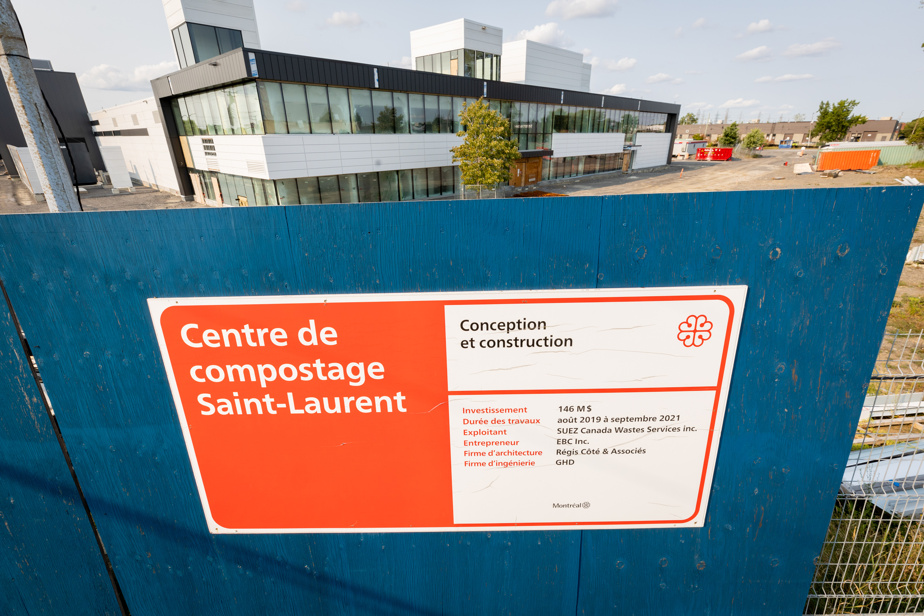If the City of Montreal hoped to see the construction sites of its future compost treatment plants resume quickly after 10 months of paralysis, it is likely to be disappointed.
While the City is still negotiating with the company Veolia for a resumption of work, several subcontractors have completely emptied the construction sites of their equipment and are accumulating millions of dollars in unpaid invoices, learned La Presse.
Some even threaten to have the sites sold by bailiffs to be reimbursed.
The two projects, located in Montreal East and Saint-Laurent, must process thousands of tons of table waste from Montrealers. They have been experiencing significant problems for years, but these reached their climax in July 2022: the general contractor EBC then left the sites, for lack of payment from its partner Veolia.
The French company, which holds the two municipal contracts, has since been trying to make the City of Montreal pay.
“With all the problems, everyone was on edge,” said Tony Vasilakos, president of Airex, a specialist dust management contractor. Mr. Vasilakos estimates his claim at between $200,000 and $250,000.
“We have actually been demobilizing for several months,” explained Francis Roy of Humaco, an acoustics subcontractor, by email. We are also waiting for the large sums due since the summer of 2022.” “We took out our trailers, we recovered the tools that remained,” confirmed Éric Ladouceur, of Ventilabec, involved in the two sites. He is owed “less than 3 [millions of dollars], more than 1”.
La Presse was able to confirm that other companies had physically left the two yards, including the automation firm Excelpro and the biotechnology company BEKON.
These departures are not only symbolic: a possible remobilization will entail additional delays and additional costs. Some specialized equipment or workers may have been deployed to other construction sites, which have taken the place of compost processing plants in the priority list.
Some have even gone so far as to file legal notices of sale in recent months, informing the City of Montreal of their desire to have the construction sites sold at auction to get paid.
“Negotiations with the City and with EBC are continuing and, if successful, we expect to be able to take on the work in a time frame acceptable to all parties as soon as possible,” Carrie K. Griffiths, communications manager for Veolia.
EBC did not want to comment on our information.
On April 15, the Plante administration had the city council vote for a 32 million increase in the budgets of compost treatment plants, after an initial increase of 13 million last year. Objective: to negotiate a resumption of work with Veolia. The overall project budget now exceeds a third of a billion dollars.
The amount released three weeks ago is intended to “ensure that the company duly pays its subcontractors so that work can resume as quickly as possible,” said Marikym Gaudrault, in Valérie Plante’s office. “The exchanges are progressing well and we are close to reaching an agreement. »
Nothing to convince the opposition at City Hall.
“It’s an endless chasm. For the benefit of Montrealers, I would like us to come to a conclusion,” Saint-Laurent Mayor Alan DeSousa said in a telephone interview.
Mr. DeSousa is not alone in being critical. At the last Montreal agglomeration council – which brings together all the cities on the island of Montreal – a group of elected officials criticized the attitude of the Plante administration in this matter. Representatives from Montreal West, Côte-Saint-Luc, Dollard-des-Ormeaux, Beaconsfield and Mont-Royal deplored the fact that Montreal is increasing its contingency budget without prior agreement with Veolia.
“Unconditionally and without an agreement, it is not reasonable or responsible to vote for this increase,” lamented Dida Berku, elected representative of Côte-Saint-Luc.
“We understand the concerns that have been expressed, we also share them,” replied Montreal elected official Émilie Thuillier. There are discussions. Not everything can be said. »
2019: The City of Montreal awards SUEZ the contracts for the design, construction and operation of two organic waste treatment centers. One will produce compost in Saint-Laurent, the other natural gas in Montreal East. SUEZ is acquired by Veolia the following year.
July 2022: EBC, the Quebec construction firm hired by Veolia for both projects, leaves the sites due to payment problems. Construction sites have since been paralyzed.
April 2023: The Plante administration votes city council to increase the project contingency budget by $32 million. This envelope had already been increased by 13 million in 2022.

